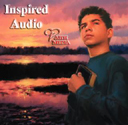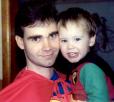Q: How do salmon give evidence of a Creator?
A: When you think about it, scientists have to spend millions of dollars to invent very complicated computer systems to produce a guided missile. And these missiles don't always hit their target.
But the Pacific salmon have a built-in guidance system that must make these same scientists drool with envy.
Research indicates that salmon are able to use the earth's magnetic field, the position of the sun, moon and stars, along with the ability to detect the chemical composition of the stream from which they began their life. All this to enable salmon to return to their native stream to spawn!
How could evolutionary scientists be so blind? The salmon's remarkable achievements, especially its amazing ability to navigate great distances with perfect accuracy, is impossible to explain as a result of purposeless and unguided evolution.
When we stand in awe at man's achievements in building advanced guided missiles--how much more should we stand in awe and worship the Creator God who created something infinitely better than the best man can do.
Source: AnswersinGenesis.org
If you enjoy this email service, I encourage you to spread the word to family and friends that we may bring inspiration to the lives ______________________________________
You can visit Michael's Author page on Facebook at: ______________________________________
You can follow Michael on Twitter at: https://www.Twitter.com/AuthorMichaelT ______________________________________
Good morning world-wide HeartTouchers.com readers!
It is with great pleasure that I get to share another story written by our son Caleb with you today. Most of you long time subscribers will remember him as the little boy in the red shirt on the cover of our book... or you may remember some of the stories that I have written about him over the years. We are incredibly proud of the young man he has become and we are excited to see what God has in store for his future. I would love it if you took the time to write to directly to him and share your thoughts about his article at the email address provided at the end of his story. From my family to yours, Author Michael T. Powers
P.S. I recently started a Nature Photography Page to share my passion for God's Creation through the art of nature photography! Come check it out at: https://www.facebook.com/MichaelTPowersPhotography/ P.S.S. Our nephew: Jeremiah Miller, is competing tonight on the TV show "The Voice" on NBC tonight. He is an amazing young man who was blessed with incredible musical talent. Tune in tonight and see how he does! ________________________________________
"I Live For Language" by Caleb M. Powers
I wrote my name on the door frame leading into the kitchen. At that age, I’d developed a bad habit of compulsively inscribing my moniker on any available surface, using any available tool. Besides the door frame and a dozen other random spots throughout our house, I had also, by this point in my career, marred the freshly painted walls of the newly constructed Clinton High School. I had used permanent marker for that, I do recall, providing a wonderfully sharp contrast to the pristine white walls of the new gym, probably during some basketball game lost in the distant past. If I got in any real trouble for these things, the punishment was fleeting and quickly forgotten. The pen marks meticulously carved into the wood of the door frame, however, were not. The marks are still there—I see them often, so often that I forget sometimes that they weren’t always part of the door frame. I spelled my middle name wrong. But that’s only natural—after all, I was only about six at the time.
The childish signature reminds me of a simpler time—a time when I was a hopeless vandal (but a classy one, I never wrote anything inappropriate in my self-indulging graffiti), a time when I would march around the kitchen table while spouting off test answers to my mother (who dutifully recorded them, smiling all the while at my faux military etiquette); a time when, before each meal, I would haul twenty pound dinosaur encyclopedias from my room to that same kitchen table (I had to have something to read while I was eating dinner, after all). Each of these images are intensely distinct in my memory, and even though I can’t help thinking that they have stuck around partially because they are stories that my family has told and retold over and over throughout the years, I want to believe that I remember them because they were important elements of what made me who I am today. You see, I’ve spent the last several years (well, my entire life really) attempting to figure out what I should do with myself—to find that one perfect juxtaposition of passion and pragmatism that screams to me that this is what I should spend the rest of my life working towards. These memories spoke to me, memories of innocent vandalism, the perks of being homeschooled when you’re a naturally restless child, and being able to pronounce incredibly complex dinosaur names with an ease that shocked most and annoyed some. These things point to the fact that I already knew what I wanted to do—what I was meant to do—I just had to get out of my own way first. My abiding love was for language and story, but like any inexperienced romantic, I first had to slog my way through those middle-school crushes and distracting puppy loves that tugged at my affections. I had to spend time immersed in language and story before I could truly fall in love. Even throughout that self-discovering time, I lived for language. All I wanted to do was speak, whether with literature or my own physical voice. I needed to speak, to show the world my thoughts, whether they wanted to hear them or not. And boy, have I spent the first twenty-two years of my life doing just that. Sometimes I regret the way those words come out, it’s true. But I never desire to be silent altogether. And even when I’m not saying anything, I listening, to hear the spoken word or read the written one with my own eyes. Language fills my every sense with its ferocity and its demand to have attention paid to it. I hear it always. Not only because we live in a world constantly surrounded by communication, but because even when there is nothing but the mindless white noise of a breeze, language fills the silence by occupying the depths of my mind. I can hear the clear voice of language as it cries out to me from memories of echoed rehearsals in the vastness of a theater lit only by the incandescent lights above us. The spoken lines filled with the communication of a story told not only by the human voice, but with the actor’s whole body. It told the story of a group of questioning middle-schoolers, or an elementary school class that had lost their teacher. Or it spoke of the Yellow Brick Road, guiding the way to the Emerald City, or a Golden Ticket giving passage into a mysterious world filled with candy. I still remember what it feels like to be surrounded by so many people I, to do this day, call dear friends, singing with all of our might in the hopes that someone in the audience would be reached by the story that we desire to communicate with them. I remember their voices, enveloping me from all sides, as we became one singular creature of communication upon the stage. We showed them those stories with our voices, made them feel what we felt simply by making strange noises with our vocal chords that somehow held meaning. I long for those days still—days when we stood together in the aftermath of the booming crescendo of the final note of a song sang of Egypt and the tired slave who just wanted it all to be over with. And even though I reclaim some small piece of it every time I stand upon a stage with people I love, I have since never been able to recapture the entire immensity of the feeling that was captured in the chorus of so many voices toiling over so many months to bring about even a single moment of distilled story, communication, and ultimately, language. I see it. In the written words of so many in our vast age of information, endlessly vomited into the churning maelstrom that is the internet. Most importantly, though, with my mind’s eye I remember so many written words over so many years sent to me by the woman I love. First in tentative friendship and anxious compliment, as both of us began to get to know each other and realized that we were, in fact, interested in each other as more than just casual acquaintances. After that, in heartfelt emotion and longing, punctuated by those famous lines “I miss you” and “I love you.” And now and again, sometimes in confusion, frustration, and anger—misunderstandings and genuine arguments that still give me a stab of pain when I think about their sharp cut. I see all these words as clearly as I was gazing down at a piece of paper in front of me. But no, I don’t, not really. For the words are not there, only the feelings they conjured. I can still see the lines of the pixelated words in English (and now and again, in Japanese hiragana) displayed on a phone screen, but their particular shapes are lost. The emotions I felt reading them, sometimes over and over again, those are the images that linger—but since they were placed there by the written word, the feelings will always be inexorably tied to sight. I feel it sometimes. The reverberating echo of plucked guitar strings and tapped piano keys. The fading tremor of a violin’s vibrato under my fingers. In my quest and hunger for language, I have discovered more than one. Music is a language as well, with its own stories to tell, its own words and phrases and abstractions that are impossible to express without the feeling of a rhythm in your chest. I remember the ache of my arms from holding the violin to my shoulder. I can still feel the shame on my face when I knew I hadn’t practiced that week, but my teacher patiently sought to instill in me a love for the violin and a desire to play it with excellence. I would like to think she did that—but I look around my room and see a guitar and a keyboard, but no sign of a violin. After all, when I was still taking lessons, I only rented one, and though I earnestly promised my beloved teacher to continue to practice even though I couldn’t afford the lessons anymore, the fact that the ache in my arms is a mere echo is the only evidence that’s needed to prove I’ve failed her. Though the language of the guitar is still as close to me as any native tongue, and my proficiency for the intricacies of the phrases spoken by the piano is in its honeymoon phase, the songs that I once sung with only the flowing of a bow across violin strings are gone. Who knows if I’ll ever have the courage to try to reclaim that lost territory. Maybe that is one language that I never truly fell in love with. I can even taste it—in the dryness of my mouth as I read or watched a story and feared for the characters. Their lives had spoken to me, not only with the dialogue the writers so carefully provided, but also with the way their language was the same as my own—the human one. The language of emotion—a language of loss and hardship (which tasted like bile and a overpowering clump of that horrible something left over in a dish with too much spice) and overwhelming joy (which tasted like the sweet and sour waves of a piece of candy) and heartbreak (which, oddly enough, tastes like nothing at all). Their fear became my own, and the dry, hollow, and bitter taste in my mouth was the product of that fear. But, like all language, you understand it the more you are enveloped in it, and as I continued to know this deep, profound language of story (uncouthly imprisoned in the hollow shell of the much inferior language of English), I came to grow more comfortable with it, and then to see it applied to my own life. Story was everywhere, connecting every moment, every idle word, every crossed path, and when you learned to see the connections, the intricate web of language that spread across humanity’s collective mind made everything easier to grasp. The taste of black tea, with honey and lemon—it comes back to me as I remember these truths. I remember writing my own stories, and feeling this deeper language resonate as my fingers fly across the keys, so fully engrossed in a story of my own making that nothing else mattered. In between each paragraph I would take a sip from the mug on the desk. I remember spending every waking moment writing my story, because it simply had to be written—I had to put it down to paper, or else some deeper part of me would never be communicated. The words that I had to share with the world would be forever hidden away in my mind if I didn’t resolve to write that next page. I wish I had the same fervor today. Writing seems like a chore sometimes, and I hate that, but it’s true. And though I’ve spoken and written in the English language over the years enough to fill thousands of novels, the language of story remains as yet grossly neglected. I hope the stories that still live a meager existence somewhere deep in the recesses of my mind can forgive me for forgetting their finer details. I at least hope I haven’t completely forgotten their taste. Yes, as ridiculous as it sounds, sometimes I can even smell it. I did say every sense, didn’t I? My mind takes me back to those days of dinosaur encyclopedias. I vandalized even books back then—I’m not sure what I wrote, but when I recall images of those long lost encyclopedias, I seem to remember haphazardly scribbled pen on most of the pages, but my handwriting was so bad back then all that comes back to me is the general sight of ink where it shouldn’t have been. The smell of books, new or old (each has a distinctive smell) communicates language to me. Books offer a deeper insight into why language is important—whether the earnest offer of discovery and new adventure that the smell of a new book offers, with its many new words filled with truths to communicate and stories to tell, or the slow, steady, but reliable call of an old book to retread, filled with old feelings to recover and paths to walk down once more. And there is a very simple reason why. You see, the written word, unlike oral stories told around a campfire, has a sense of permanency about it. As humans, we long for that. A sense of belonging that can only come when things are fixed, or at least difficult to change. Sometimes, written words can have an efficacy to them that is unmatched by any spoken language. I won’t ever remember exactly what the answers to that test were—the one that I took while marching around the kitchen table like a rank-and-file soldier. But I will always remember that the house I grew up in was forever marked by my presence by ink on wood. And I will always remember that I misspelled my name. Caleb M. Powers xcarthan12 @ gmail.com Caleb Powers lives in Wisconsin with his family. He is a junior in college who enjoys writing, reading, playing guitar, and acting, among other things. He is the Creative Programming Director at Faith Community Church in Janesville, has written over 30 original songs and has performed in many musicals at the Janesville Performing Arts Center. He is currently working on an epic fantasy novel and is pursuing writing as a career. Most importantly, Caleb believes that life is not about religion, but about a relationship -- a relationship with Jesus Christ.
You can listen to one of his latest songs called "The Journey Home" at this link: http://calebmpowers.com/blog/2017/2/18/the-journey-safely-home You can also read the first story of his we ran on HeartTouchers a couple of years ago at this link: http://hearttouchers.com/after_all_by_caleb_powers ______________________________________ Creation Q & A
______________________________________ Thought For The Day
______________________________________
______________________________________
Dear Michael, |

































